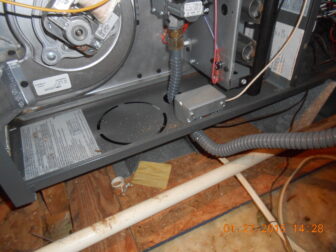The recent four-alarm fire that roared through the top floor of a Garden District home is one of several incidents this winter that call attention to the need for better prevention.
Attics can be like loaded guns – accidents waiting to happen – when gas furnaces and water heaters are not properly installed, upgraded and serviced.
Concerned that potentially lethal mistakes were being made as the region rebuilt after Hurricane Katrina, a group of contractors got together to form the non-profit Southeast Louisiana Coalition of the Air Conditioning Industry, primarily to educate professionals and the general public.
House fires are terrifying events, and yet faulty practices continue, among them improperly installed flexible supply lines to fuel furnaces with natural gas or propane. This common code violation can turn a house into a powder keg when lightning strikes or even from everyday vibrations.
Another under-appreciated problem is that some of the new technologies such as foam-sealed roofs and attics can also trap toxic fumes.
Health and safety are paramount concerns, but energy efficiency also improves — and utility costs can be reduced — when systems are properly installed. That said, the new technologies sometimes require a revamped understanding of how a building “breathes.” A few examples:
- Today’s improved insulations, building wraps, and air-sealing — creating buildings that are considered “tight” — may require the introduction of fresh air through mechanical ventilation for comfort, health, and building durability. Indeed, the Louisiana building code now requires mechanical ventilation in tight buildings, an added expense but one worth the cost.
- Combustion appliances, such as water heaters, gas furnaces, kitchen cooking appliances and fireplaces, require proper exhaust of flue gases. The lack of good exhaust systems is a key factor in the spate of house fires that comes with winter weather in New Orleans.
- Stainless steel corrugated gas lines and connectors can trigger explosions, if not installed to manufacturer’s instructions. And the list goes on.

In my 25 years as a volunteer with a local fire department, I’ve seen my share of fatalities due to house fires. As an air-conditioning contractor, I’ve joined with other professionals to lobby for an effective statewide building code. Such a code was enacted post-Katrina but remains under-appreciated by many contractors — as are the hazards that come with failure to follow its guidelines. And enforcement is lax, given just one state employee to oversee local code jurisdictions throughout Louisiana.
Three colleagues, including a fire inspector, joined me Tuesday evening to air these important issues at an event open to contractors as well as the general public called “Fire and Fumes.” Additional trainings and public forums are scheduled.
Trent Naquin is a certified emergency medical rescuer and an air-conditioning contractor based in Labadieville.

